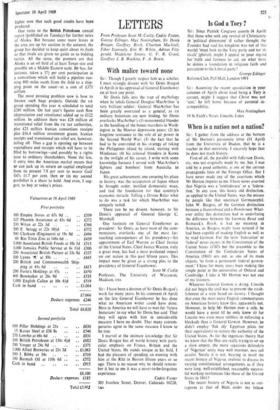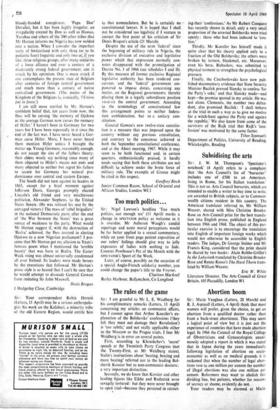When is a nation not a nation?
Sir: I gather from the address at the bottom of Mr Horton's passionate letter (11 April) from the University of lbadan, that he is a teacher in that university. I sincerely hope that he does not teach history.
First of all, the parallel with Jefferson Davis, etc, was not originally made by me, but, I was told by a good authority, is one of the current propaganda lines of the Foreign Office. But 1 have never made any of the assertions which Mr Horton imputes to me. I have never asserted that Nigeria was a 'confederacy' or a `federa- tion.' In any case, this hoary old distinction, as applied to the United States, was the misuse by people like that uncritical Germanophil, John W. Burgess, of the German distinction between a Staatenbund and a Bundestaat. What- ever utility this distinction had in underlining the difference between the German Band and Bismarck's Reich. it had no meaning in America, as Burgess might have noticed if he had been capable of reading English as well as he read German. For the term 'federation' or 'federal' never occurs in the Constitution of the United States (1787) but the preamble to the Constitution of the Confederate States of America (1861) sets out, as one of its main objects, `to form a permanent federal govern- ment.' I have for many years been making this simple point in the universities of Oxford and Cambridge. I take it Mr Horton was not one of my listeners.
Whatever General Gowon is doing. Lincoln did not begin the civil war to prevent the estab- lishment of a state based on slavery. I thought that even the most naive English commentators on American history knew this; apparently not. However, to help Mr Horton over a stile, he would have a point (if he only knew it) for Lincoln was even more ruthless in enforcing a blockade than is General Gowon. However, be didn't employ 'flak sh'y' Egyptian pilots (or their equivalents) to restore the authority of the United States. As for the ingenious theory that we know that the Ibos are really trying to set up a slave empire, the more sagacious defenders of 'Nigerian' unity may well murmur. non tali auxilio.'Surely it is not, bearing in mind the recent history of Nigeria, realistic to discuss its varying constitutional arrangements as if they were long, well-established, reasonably success- ful working institutions like those of the United States in 1861?
The recent history of Nigeria is not as out- rageous as that of Haiti under my fellow bloody-handed conspirator, 'Papa Doc' Duvalier, but it has been highly irregular, an irregularity created by Ibos as well as Hausas, Yorubas and others of the 300 other tribes that Mr Horton informs me Nigeria has now welded into a nation. When I consider the imperfect unity of Switzerland with only three (or to be pedantic four) linguistic and only two or; ikyou like, three religious groups, after many centuries of a loose alliance and over a century of a moderately strong federal government, one is struck by his optimism. One is more struck if one contemplates the present state of Belgium after centuries of foreign central government and much more than a century of native centralised government. (The motto of the Kingdom of the Belgians is, ironically, l'Union fait la force.') I am still more startled by Mr. Horton's confident belief that, ten years from now, the Ibos will be cursing 'the memory of Ojukwu as the average German now curses the memory of Hitler.' I haven't been in Germany for two years but I have been repeatedly in it since the end of the last war. I have never heard a Ger- man curse Hitler. More, I have never heard them mention Hitler unless I brought the matter up. Young Germans, reasonably enough, do not accept the sins of the fathers theory; their elders wisely say nothing since many of them objected to Hitler's means not ends and many objected to neither but regret his failure to secure for Germany her natural pre- dominance over central and eastern Europe.
The South did not turn against its leaders in 1865, except for a brief moment against Jefferson Davis. Georgia promptly elected Lincoln's old friend and very mischievous politician, Alexander Stephens, to the United States Senate. (He was refused his seat by the outraged victors.) The mass of 'rebel brigadiers' in the national Democratic party after the end of 'the War between the States' was a great source of weakness to the party. What would Mr Horton suggest if, with the destruction of 'Biafra' achieved, the Ibos insisted in electing Ojukwu to a new Nigerian parliament? I pre- sume that Mr Horton got my allusion to Yeats's famous poem when I mentioned the 'terrible beauty' that was born in Biafra. The Easter Week rising was almost universally condemned all over Ireland. Its leaders were made heroes by the executions that followed. Mr Horton's prose style is so heated that I can't be sure that he would attempt to dissuade General Gowon from imitating Sir John Maxwell.











































 Previous page
Previous page